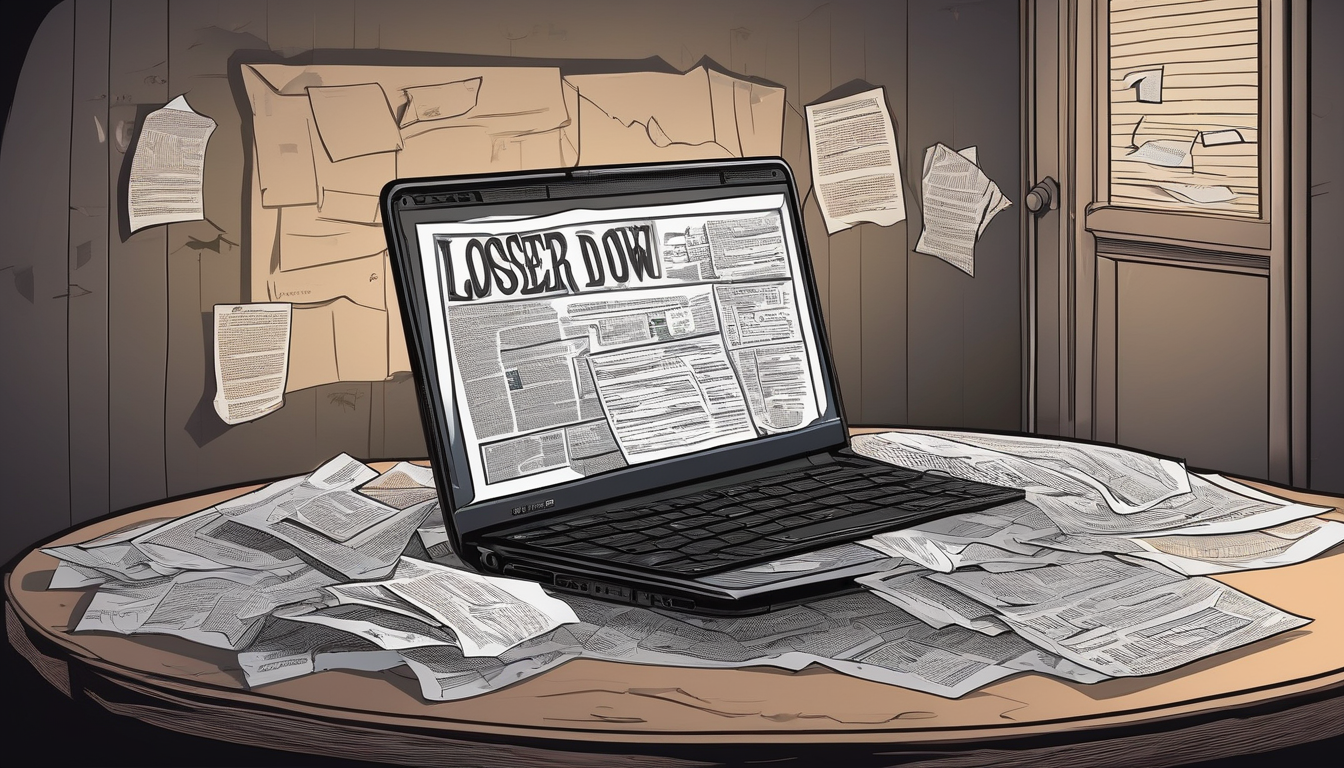The Dark Side of Social Media: How It Affects Self-Esteem

In today’s fast-paced digital world, social media has become a double-edged sword, slicing through our lives with both convenience and chaos. While it allows us to connect with friends and family, it also opens the door to a myriad of negative impacts on our self-esteem. It’s like walking through a beautiful garden filled with vibrant flowers, only to realize that hidden among them are thorns that can prick and hurt. This article explores the negative impacts of social media on self-esteem, delving into issues such as comparison, cyberbullying, and the pursuit of validation, while also offering potential solutions for healthier engagement.
Social media platforms often foster a culture of comparison, where users measure their worth against curated images and lifestyles. Think about it: when you scroll through your feed, you’re bombarded with perfectly filtered photos and seemingly flawless lives. This constant comparison can lead to feelings of inadequacy and low self-esteem. It’s like standing in a room full of mirrors, each reflecting an idealized version of someone else, making you question your own reflection. The pressure to keep up can be overwhelming, and it’s vital to recognize how this culture shapes our self-perception.
The anonymity of social media can lead to increased instances of cyberbullying, which significantly impacts victims’ self-esteem. Understanding the dynamics of online harassment is crucial for addressing its effects on mental health. Imagine being in a crowded room where everyone is whispering about you, and you can’t identify the source. That’s the reality for many who face cyberbullying. The emotional toll can be devastating, and it’s essential to shed light on this issue.
Cyberbullying can manifest in various forms, including harassment, impersonation, and exclusion. Each type can have devastating effects on the victim’s self-worth and emotional well-being. Here’s a brief overview of these forms:
- Harassment: Repeatedly sending offensive messages.
- Impersonation: Pretending to be someone else to damage their reputation.
- Exclusion: Intentionally excluding someone from online groups or activities.
Victims of cyberbullying often experience anxiety, depression, and low self-esteem. The emotional toll can be long-lasting, affecting their daily lives and relationships. It’s like carrying a heavy backpack filled with stones; over time, it becomes harder to move forward. This burden can hinder personal growth and happiness, making it crucial to address the root causes of such behavior.
Implementing prevention strategies, such as promoting kindness and empathy online, can help reduce cyberbullying. Schools and parents play vital roles in educating young users about respectful online behavior. It’s essential to create an environment where compassion thrives, and everyone feels safe to express themselves without fear of judgment.
Access to support resources, such as counseling and hotlines, is essential for those affected by cyberbullying. These resources can provide guidance and help rebuild self-esteem. Just like a lighthouse guiding ships through a storm, these services can illuminate a path to recovery and healing.
Many users seek validation through likes and comments, which can create an unhealthy dependence on external approval. This pursuit can lead to decreased self-esteem when expectations are not met. It’s akin to chasing a mirage in the desert; the more you chase it, the more it eludes you. This relentless quest for affirmation can distort self-image, leading individuals to base their self-worth on online interactions rather than intrinsic qualities and achievements.
The need for social validation can distort self-image, leading individuals to base their self-worth on online interactions rather than intrinsic qualities and achievements. It’s vital to recognize that true self-esteem comes from within and not from the number of likes on a post.
Adopting healthy engagement practices, such as limiting screen time and curating positive feeds, can foster a more positive relationship with social media and enhance self-esteem. Think of it as tending to your mental garden; by removing the weeds of negativity and nurturing the flowers of positivity, you can cultivate a thriving sense of self-worth.

Comparison Culture
Social media platforms have revolutionized the way we connect and communicate, but they also come with a dark side—a pervasive culture of comparison. Every time you scroll through your feed, you’re bombarded with curated images and seemingly perfect lifestyles that can make anyone feel inadequate. It’s like walking into a high school cafeteria where everyone is flaunting their best outfits and most exciting stories, while you sit there wondering if you even belong. This constant comparison can lead to a downward spiral of self-doubt and low self-esteem.
Think about it: when was the last time you saw a post that made you feel good about yourself? More often than not, we find ourselves measuring our worth against the highlight reels of others. This culture can create an illusion that everyone else is living their best life, while we struggle with our own imperfections. It’s a toxic cycle where likes and comments become the yardstick for self-worth. The more we compare, the more we feel like we fall short.
Moreover, the impact of comparison culture is not just emotional; it can also affect our mental health significantly. Studies show that individuals who engage heavily with social media are more likely to experience feelings of anxiety and depression. When your self-esteem is tied to the number of likes or followers you have, it can feel like a rollercoaster ride—one moment you’re on top of the world, and the next, you’re plummeting into despair.
To illustrate this, consider the following statistics:
| Statistic | Percentage |
|---|---|
| People who feel pressure to present a perfect life online | 70% |
| Individuals who experience anxiety from social media comparison | 60% |
| Users who report low self-esteem due to social media | 50% |
So, how do we combat this comparison culture? First, it’s essential to recognize that what we see online is often a distorted reality. People tend to share their best moments and filter out the mundane or challenging aspects of life. Understanding this can help us shift our perspective and focus on our own journey rather than someone else’s highlight reel. Additionally, curating your social media feed to include accounts that promote positivity and authenticity can create a healthier online environment.
In conclusion, while social media can be a fantastic tool for connection, it’s crucial to be mindful of the it fosters. By acknowledging the impact of these platforms on our self-esteem and actively working to create a more positive online experience, we can reclaim our self-worth and foster a healthier relationship with ourselves and others.

Cyberbullying
In today’s digital age, the anonymity provided by social media platforms has unfortunately paved the way for a disturbing phenomenon known as . This form of bullying can occur anytime and anywhere, making it particularly insidious. Unlike traditional bullying, which often takes place in person, cyberbullying can follow victims into their homes, creating a sense of inescapability. It’s like being haunted by a ghost that won’t let you rest, constantly lurking in the shadows of your notifications.
Understanding the dynamics of online harassment is crucial for addressing its effects on mental health. Victims often find themselves trapped in a vicious cycle of negativity, leading to feelings of isolation and despair. The emotional scars left by cyberbullying can be profound, affecting not just self-esteem but also overall mental well-being. Imagine standing in a crowded room, yet feeling utterly alone, as the whispers of your peers echo in your mind.
Cyberbullying can manifest in various forms, including:
- Harassment: Constantly receiving hurtful messages or comments.
- Impersonation: Someone pretending to be you online, spreading lies or damaging your reputation.
- Exclusion: Being deliberately left out of online groups or conversations.
Each type can have devastating effects on the victim’s self-worth and emotional well-being. For instance, a single hurtful comment can linger in a person’s mind like a bad song stuck on repeat, overshadowing any positive interactions they might have. The impact of these negative experiences can lead to serious mental health issues, such as anxiety and depression.
Victims of cyberbullying often experience a range of emotional challenges. The psychological toll can be long-lasting, affecting daily lives and relationships. Imagine waking up each day with a cloud of dread hanging over you, feeling as though you’re walking on eggshells. The struggle to maintain a sense of normalcy becomes an uphill battle, as the effects of online harassment seep into every aspect of life.
To combat this growing issue, implementing prevention strategies is essential. Promoting kindness and empathy online can create a more supportive environment for everyone. Schools and parents play vital roles in educating young users about respectful online behavior. It’s like teaching a child to navigate a busy street; they need guidance to avoid potential dangers. By fostering a culture of respect and understanding, we can help reduce the prevalence of cyberbullying.
Access to support resources, such as counseling and hotlines, is crucial for those affected by cyberbullying. These resources can provide guidance and help rebuild self-esteem. Just as a lighthouse guides ships safely to shore, support systems can help individuals navigate the turbulent waters of online harassment. If you or someone you know is struggling, reaching out for help can be the first step toward healing.
Types of Cyberbullying
Cyberbullying is a pervasive issue that can take many forms, each with its own set of consequences. Understanding these types is essential for recognizing the signs and addressing the problem effectively. One of the most common forms is harassment, where individuals receive threatening or abusive messages. This can occur in comments, direct messages, or even through posts that target the victim. Imagine receiving a barrage of negative messages that chip away at your self-worth; that’s the reality for many victims.
Another alarming type of cyberbullying is impersonation. Here, bullies create fake profiles to impersonate someone else, often spreading false information or damaging rumors. This not only confuses the victim but can also lead to severe reputational harm. It’s like a puppet show where someone else pulls the strings, leaving the victim feeling powerless and confused.
Exclusion is yet another form, where individuals are deliberately left out of online groups or conversations. This can manifest in social media platforms where a group of friends might create a private chat and leave someone out, leading to feelings of isolation. Imagine standing outside a party, watching everyone inside having fun while you’re left in the cold. This type of bullying can be particularly devastating as it erodes the victim’s sense of belonging.
Each of these forms of cyberbullying can lead to significant emotional distress. Victims may experience feelings of shame, anger, and sadness, which can spiral into more severe mental health issues like anxiety and depression. The impact is not just immediate; it can linger long after the bullying has stopped. To illustrate the severity of these effects, consider the following table:
| Type of Cyberbullying | Potential Effects |
|---|---|
| Harassment | Anxiety, Depression, Low Self-Esteem |
| Impersonation | Confusion, Reputation Damage, Isolation |
| Exclusion | Isolation, Loneliness, Decreased Self-Worth |
Recognizing these types of cyberbullying is the first step towards combating it. By raising awareness and fostering open conversations about these issues, we can create a safer online environment for everyone. Remember, every click and comment can either build someone up or tear them down. It’s essential to choose kindness and support in our digital interactions.
Impact on Mental Health
The impact of cyberbullying on mental health is profound and often devastating. Victims may find themselves trapped in a cycle of negative thoughts and feelings, leading to serious emotional distress. Imagine waking up every day, checking your social media, and instead of feeling uplifted, you’re bombarded with hurtful messages or derogatory comments. This constant barrage can lead to a range of mental health issues, including:
- Anxiety: The fear of being judged or ridiculed can create a constant state of worry.
- Depression: Feelings of hopelessness and sadness can become overwhelming.
- Low Self-Esteem: Victims often start to believe the negative things said about them, leading to a diminished sense of self-worth.
Research has shown that the emotional toll of cyberbullying can linger long after the attacks have stopped. Victims may struggle with trust issues, making it difficult to form or maintain relationships. It’s like trying to walk through a fog—everything feels uncertain and daunting. The psychological scars can affect their daily lives, from academic performance to social interactions.
Moreover, the anonymity provided by social media can exacerbate these issues. Bullies often feel emboldened to say things they would never dare to say in person, leading to a culture where cruelty can thrive. This environment not only harms the victims but also creates a toxic atmosphere for everyone involved. It’s crucial to recognize that the effects of cyberbullying extend beyond the individual; they can ripple through communities, affecting friends, family, and even bystanders who witness the harassment.
Addressing these mental health impacts requires a multifaceted approach. Awareness campaigns, school programs, and parental involvement can play significant roles in helping victims cope and heal. It’s essential to create safe spaces for open discussions about mental health, where individuals feel supported and understood. Just like a plant needs sunlight and water to thrive, individuals need compassion and understanding to rebuild their self-esteem and mental well-being.
Prevention Strategies
In the digital age, where social media is an integral part of our lives, preventing cyberbullying and fostering a positive online environment is more important than ever. One of the most effective strategies is to promote kindness and empathy in online interactions. This can start at home and in schools, where parents and educators can lead by example, teaching young users the importance of treating others with respect. When kindness is emphasized, it creates a ripple effect, encouraging others to follow suit.
Furthermore, it’s essential to establish clear guidelines for online behavior. Schools can implement programs that educate students about the impact of their words and actions online. Workshops and discussions can be organized to help students understand the emotional toll that cyberbullying can take on individuals. By fostering an environment of open communication, victims may feel more comfortable seeking help and reporting incidents of bullying.
Another crucial aspect of prevention is the role of technology itself. Social media platforms can take proactive measures by implementing reporting features that are easy to use and ensuring that there are strict consequences for those who engage in cyberbullying. These platforms should also provide resources and support for victims, helping them to navigate the emotional challenges they face.
To further enhance these strategies, parents and guardians should encourage their children to engage in healthy online habits. This can include:
- Setting time limits on social media usage to prevent excessive exposure.
- Encouraging the curation of positive and supportive social media feeds, as this can significantly improve self-esteem.
- Promoting offline activities and hobbies that foster real-life connections and self-worth.
By combining these efforts, we can create a more supportive online community. Remember, every little action counts. Whether it’s a simple compliment or standing up for someone being bullied, these small gestures can make a world of difference. Together, we can build a safer digital space where everyone feels valued and respected.
Support Resources
When it comes to tackling the emotional turmoil caused by cyberbullying and social media pressures, having access to the right support resources is absolutely crucial. These resources can act as a lifeline for those struggling with their self-esteem, providing guidance, understanding, and a path toward healing. Imagine trying to navigate a stormy sea without a compass; support resources serve as that compass, helping individuals find their way back to calmer waters.
There are various avenues for support, including counseling services, hotlines, and online communities. Each of these options can offer unique benefits:
- Counseling Services: Professional therapists can provide personalized support, helping individuals to process their feelings and develop coping strategies. They can also help in rebuilding self-esteem through various therapeutic techniques.
- Hotlines: Many organizations offer hotlines where individuals can speak with trained professionals who understand the challenges they face. These conversations can be incredibly validating and can provide immediate emotional support.
- Online Communities: Finding a safe space online where people share similar experiences can be incredibly comforting. These communities often offer a sense of belonging and can help individuals realize they are not alone in their struggles.
In addition to these resources, it’s important to remember the role of friends and family. They can provide a support system that is invaluable. Encouraging open conversations about feelings and experiences can foster a supportive environment where individuals feel safe to express themselves. It’s like having a sturdy life raft when the waves of self-doubt start crashing in.
Furthermore, schools can play a pivotal role in providing support. Implementing programs that focus on mental health awareness and anti-bullying initiatives can empower students to seek help and support one another. Creating an environment where kindness and empathy are prioritized can significantly reduce the impact of cyberbullying.
Ultimately, finding the right support resources can make a world of difference. Whether it’s through professional help, community support, or the love of family and friends, the journey to reclaiming one’s self-esteem is a path worth taking. Remember, it’s okay to ask for help; it’s a sign of strength, not weakness. With the right support, individuals can rise above the challenges posed by social media and emerge stronger than ever.

The Pursuit of Validation
In today’s digital age, the quest for validation has transformed into a double-edged sword. Social media platforms like Instagram, Facebook, and TikTok have become the playgrounds where users showcase their lives, often curating a reality that sparkles on the surface but may be far from the truth. Have you ever found yourself scrolling through a friend’s feed, admiring their perfectly filtered photos, and feeling a twinge of envy? That’s the power of social validation at play. It’s almost as if these platforms have become a stage where we all perform, seeking applause in the form of likes and comments.
The need for social validation can create a vicious cycle. When a post receives a flood of likes, it can feel exhilarating, almost addictive. However, the moment those notifications dwindle, a wave of self-doubt can crash over us. This dependency on external approval can distort our self-image, leading individuals to base their self-worth on these fleeting interactions rather than their intrinsic qualities and achievements. It’s like building a house on sand; the structure may look impressive, but it’s always at risk of collapsing under the weight of reality.
Moreover, this constant chase for validation can have detrimental effects on mental health. Research shows that individuals who heavily engage in social media often report feelings of anxiety and depression. They might find themselves trapped in a comparison game, measuring their lives against the highlight reels of others. This can lead to a skewed perception of reality, where one believes they are not living up to societal standards, further diminishing their self-esteem.
To combat this unhealthy obsession, it’s essential to adopt healthy engagement practices. Here are a few strategies that can help:
- Limit Screen Time: Set boundaries on how much time you spend on social media. This can help reduce the pressure to constantly check for validation.
- Curate Your Feed: Follow accounts that inspire you and promote positivity. Unfollow those that make you feel inadequate or trigger negative emotions.
- Focus on Real-Life Interactions: Invest time in face-to-face relationships. Genuine connections can provide a sense of belonging that social media often fails to deliver.
In conclusion, while the pursuit of validation through social media can be tempting, it’s crucial to remember that true self-worth comes from within. By fostering a healthy relationship with social media and prioritizing our mental health, we can break free from this cycle and cultivate a stronger sense of self. After all, wouldn’t it be wonderful to celebrate our achievements and uniqueness without the need for likes and comments?
Effects of Social Validation
In today’s digital landscape, the need for social validation has become a powerful force shaping our self-perception. Many users find themselves caught in a web of likes, comments, and shares, where their self-worth is often measured by the number of interactions they receive. This constant chase for approval can create an unhealthy dependency on external validation, leading individuals to question their value when the social media metrics don’t meet their expectations.
Imagine walking into a room filled with people, and instead of engaging in genuine conversations, everyone is glued to their phones, waiting for that little notification that says, “You’re liked!” It’s a modern-day popularity contest, and the stakes can feel incredibly high. When someone posts a photo or a thought, the anticipation of likes can become overwhelming. If the response is less than expected, it can trigger feelings of inadequacy and self-doubt.
Moreover, the effects of social validation extend beyond just feelings of inadequacy. Studies have shown that individuals who rely heavily on social media for validation are more prone to experience anxiety and depression. The emotional rollercoaster of fluctuating likes and comments can lead to a distorted self-image, where one’s perception of themselves is based more on online interactions than on their intrinsic qualities and achievements. This can be particularly damaging for young people still forming their identities.
To illustrate the impact of social validation, consider the following table that outlines the potential emotional responses based on social media interactions:
| Type of Interaction | Emotional Response |
|---|---|
| High Likes/Positive Comments | Boost in self-esteem, happiness |
| Low Likes/Negative Comments | Feelings of inadequacy, sadness |
| No Interaction | Self-doubt, anxiety |
As we navigate this complex relationship with social media, it’s vital to recognize that our self-worth should not be dictated by the digital applause we receive. Building a strong sense of self that is rooted in personal achievements and authentic connections can mitigate the negative effects of social validation. By focusing on internal validation—the kind that comes from within—we can foster a healthier relationship with ourselves and with social media.
Ultimately, the journey toward self-acceptance begins with understanding that validation from others is fleeting and often superficial. Instead of chasing likes, let’s strive for genuine connections and embrace our unique qualities. After all, true self-esteem comes from knowing and appreciating who we are, beyond the screen.
Healthy Engagement Practices
In today’s digital age, where social media platforms dominate our daily interactions, it’s crucial to adopt to protect our self-esteem and mental well-being. One of the most effective strategies is to limit screen time. By setting boundaries on how long we spend scrolling through feeds, we can reduce the chances of falling into the trap of comparison and negativity. Imagine giving yourself a break, just like stepping outside for fresh air; it can rejuvenate your mind and spirit.
Another important practice is to curate your social media feeds. This means actively choosing who to follow and what content to engage with. Surrounding yourself with positive influences can significantly enhance your online experience. Think of it as gardening: you wouldn’t want weeds choking your flowers, right? By unfollowing accounts that make you feel inadequate or anxious, you allow room for growth and positivity. Instead, seek out accounts that promote self-love, body positivity, and mental health awareness.
Moreover, engaging with your community in a meaningful way can create a sense of belonging and support. Participate in discussions that uplift rather than tear down. Commenting on posts with encouragement or sharing your own experiences can foster a more positive atmosphere. It’s like building a supportive neighborhood where everyone looks out for each other, rather than one filled with judgment and negativity.
Lastly, consider taking social media detoxes from time to time. This doesn’t mean you have to disappear completely; rather, it’s about taking intentional breaks to focus on real-life connections and activities that bring you joy. Whether it’s spending time with friends, picking up a new hobby, or simply enjoying nature, these experiences can help you reconnect with yourself and boost your self-esteem.
In summary, by implementing these healthy engagement practices, we can create a more positive relationship with social media. Limiting screen time, curating our feeds, engaging meaningfully, and taking breaks are all steps towards enhancing our self-esteem and mental health. Remember, social media should be a tool for connection, not a source of stress or comparison.
Frequently Asked Questions
- How does social media impact self-esteem?
Social media can significantly affect self-esteem by fostering a culture of comparison. Users often compare their lives to the curated images they see online, which can lead to feelings of inadequacy and low self-worth. This constant comparison can create a cycle of negative self-perception.
- What is cyberbullying and how does it affect individuals?
Cyberbullying refers to online harassment where individuals are targeted through various means, such as negative comments, impersonation, or exclusion from social groups. The emotional toll can be devastating, leading to anxiety, depression, and a decrease in self-esteem for the victims.
- What are some common types of cyberbullying?
Cyberbullying can manifest in several forms, including:
- Harassment: Repeatedly sending offensive messages.
- Impersonation: Pretending to be someone else to harm their reputation.
- Exclusion: Intentionally leaving someone out of online groups or activities.
Each type can severely impact a person’s emotional well-being and self-worth.
- How can I protect myself or someone else from cyberbullying?
To combat cyberbullying, it’s essential to promote kindness and empathy online. Educating young users about respectful online behavior, encouraging open discussions about online experiences, and reporting harmful content can help create a safer digital environment.
- What should I do if I’m affected by cyberbullying?
If you or someone you know is affected by cyberbullying, accessing support resources is crucial. Counseling services and hotlines can provide guidance and emotional support, helping individuals rebuild their self-esteem and cope with the situation.
- Why do people seek validation on social media?
Many individuals seek validation through likes and comments as a means to boost their self-esteem. This external approval can create an unhealthy dependency, leading to a distorted self-image when expectations are not met, making it vital to recognize the difference between online interactions and intrinsic self-worth.
- What are healthy engagement practices for social media?
To foster a positive relationship with social media, consider adopting healthy engagement practices such as:
- Limiting screen time to reduce exposure to negative content.
- Curating your feed to follow positive and uplifting accounts.
- Engaging in offline activities to balance your digital life.
These strategies can help enhance self-esteem and promote a healthier online experience.














The AI regulation and compliance section is spot on. With the rise of AI adoption, ethical considerations will be crucial.…